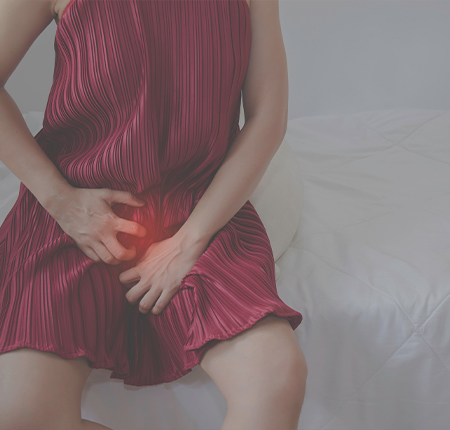
So the first thing that comes to mind when you notice irritation in the intimate area is an infection or a sexually transmitted disease? Although it is not excluded, often the situation is not so serious. Itching, stinging, and even swelling in the intimate area is more common than you might expect.
Yes, genital irritations can be a symptom of sexually transmitted infections or even vulvar cancer, but they can also be simple inflammations caused by allergens in the products you use. The important thing is that, whatever the cause, you discover it as soon as possible. Irritations will improve when you address the cause, either by treatment or by eliminating the irritants.
How common are genital irritations (in the intimate area)
Statistics do not show exact numbers of people with specific symptoms. But the truth is that most likely everyone has faced some type of irritation in the intimate area at least once in their life, whether we are talking about itching, stinging or some other form of irritation.
There are dozens of factors that can irritate you, from hormonal changes you can't control to the hygiene products you use, clothes and menstrual care products. So anyone can have groin irritation at some point, regardless of age, gender or sexual experience. It does not necessarily mean that there is an infection.
It is generally not a serious problem and does not require treatment if it does not persist, does not come back, is not severe (to the point of affecting your life) and is not accompanied by severe, visible irritation with unusual vaginal discharge. But it is important to find out the irritants so that you can remove them.
Causes of genital irritation
infections (various: with parasites, fungi, candida)
Balan
herpes
pox
genital warts
psoriasis
contact dermatitis or allergies
Vaginal itching, redness, bumps and irritation in the intimate area can have many and varied causes.
They can be hormonal in nature, for example at menopause. When estrogen production decreases and vaginal dryness occurs, the predisposition to intimate flora imbalances and irritations increases. The same symptoms can be caused by stress, vulvar cancer or wounds in the intimate area, and it is important to pay attention to the signs and seek the help of a specialist if they persist.

But in addition to the above reasons, the most common causes of genital irritation are:
What symptoms accompany irritations in the intimate area
Genital irritations can be very uncomfortable and not just a slight redness or itchiness. Sometimes the symptoms can become very unpleasant. Among the signs that can accompany these irritations can be:
Redness and swelling of the genitals
Itchy and inflamed skin
Fluid blisters
Lumps or pimples on the vulva
Wounds and injuries
Stinging sensation
Pelvic pains
Unusually colored or foul-smelling vaginal discharge
Pain or tenderness during intercourse
Discolored portions of the skin
Stinging or pain when urinating
Swelling of the lymph nodes
Sore throat
Fatigue
Fever

Treatment of genital irritations (in the intimate area)
A minor irritation caused by stressors or irritants in clothing and grooming products usually goes away on its own shortly after you stop putting your skin in contact with the source of the irritation.
If, on the other hand, the symptoms persist, worsen, are accompanied by discharge, pain or intense discomfort and affect your life, then it is time for a consultation with a specialist. Most likely the cause is another condition, and self-medication is not a solution in this situation.
Treatment for inflammation of the intimate area is prescribed depending on the cause and symptoms. To begin with, the doctor may order tests such as:
Depending on the results of the analyzes and the diagnosis obtained, the doctor can recommend a suitable treatment.
Drug and local treatment
Treatment is primarily aimed at treating the condition that is causing the irritations, so it differs depending on the cause. The doctor can recommend both a medicinal and a local treatment to relieve the discomfort:
Antibiotics (gel or tablets): in the case of bacterial vaginosis or candidiasis, certain sexually transmitted infections (chlamydia, gonorrhea, trichomoniasis) or even in the case of a urinary infection
Cortisone cream: to treat the affected area in case of eczema
Corticosteroid ointments: to relieve symptoms caused by psoriasis or lichen sclerosus or lichen planus
Antifungals (in the form of pills or suppositories): to treat fungal infections and prevent their spread to other organs (eg lungs)
Antihistamines: to treat itching caused by lichen planus
Antivirals: to relieve the symptoms of genital herpes and decrease the chance of recurrence
Antiparasitic solutions: to get rid of parasites such as pubic lice
Estrogen creams: if itching and burning are caused by vaginal dryness, in turn a response to the decrease in estrogen production in the body at menopause.
Home remedies for infections located in the intimate area
Often, the discomfort becomes very intense even if you are under medical/local treatment prescribed by your doctor. What you can do at home during this time is to take care of hygiene and intimate care products, choosing ingredients that are as pure as possible.
Use Enroush intimate gel for daily cleaning of the vulva with 95% natural ingredients and 87% effectiveness against Candida albicans, as it does not contain parabens or fragrance with allergens. And for the times when you need a quick cleaning (for example after using the toilet during menstruation or on the move), use the biodegradable intimate wipes . They are hypoallergenic, enriched with lactic acid, prebiotics and chamomile to gently clean your vulva and protect your intimate flora without any compromise for your genital health.
There are indeed other home remedies that can relieve the discomfort. Some of the most common ones are ice wrapped in a towel and placed on the inflamed area of the vulva, and over-the-counter anti-itch creams.
But keep in mind that self-medication (ie treating yourself at home without a doctor's guidance) is never the best solution. It may be completely ineffective in the case of a more serious infection. And when you treat one problem and the cause is another, an inappropriate treatment can even worsen the symptoms. So before you try any natural remedy, talk to your doctor and ask for his advice.

How to prevent genital irritation
The best way to prevent genital irritation is to avoid contact of products that can irritate you with the skin of your intimate area, and to avoid conditions that cause inflammation in the intimate area. Here's how you can do this:
Frequently asked questions about irritation in the intimate area
No one wants to face irritations in the intimate area. So it's understandable why you want to know as much as possible about how to treat them and how to prevent them. Below we will answer the most frequently asked questions about these things.
What aggravates irritations in the intimate area?
Among the factors that have the greatest potential to aggravate irritation in the intimate area are sweat, tight clothing and synthetic fibers that do not allow the skin to breathe. Symptoms can also worsen when in contact with dyes, bleaches, detergents or fragrances with allergens in hygiene products: soaps, shower gels, conventional absorbents, intimate deodorants, etc.
When should I go to the doctor if I have irritation in the intimate area?
See your doctor as soon as possible if the irritation persists, worsens, is recurrent (i.e. comes and goes), or is accompanied by unusual vaginal discharge, bleeding, pain, fatigue, or fever.
What questions should I ask my doctor?
If you experience vaginal irritations, ask your doctor everything that worries you and everything you need to know about how to treat and how you can prevent such inflammations in the future. Ask what is causing your irritations, what is the most effective form of treatment and what you can do at home to relieve your symptoms. You can also ask which products you should avoid in the future and which are safe for your skin.
What tests are done to diagnose genital irritation?
The doctor will first examine the appearance of the affected area, paying attention to color, texture and symptoms. It will also consider your medical history, including whether you've had unprotected sex. For a correct diagnosis, tests of vaginal secretions, blood tests and skin tests can also be done.
Can genital irritation go away on its own without treatment?
If the irritations are mild and occur after epilation or in response to contact with allergens in shower gel, bath foam or conventional menstrual products, yes. Symptoms may go away on their own, without treatment, after stopping the use of the respective products. But if the irritations are severe and persistent, they may be due to a more serious condition, requiring a visit to the doctor and treatment.






















